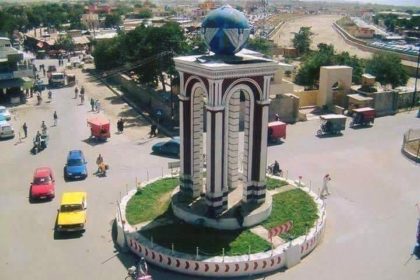RASC News Agency: In a striking display of belligerence, Mullah Noorullah Noori, the Taliban’s Minister for Borders, Ethnic Affairs, and Tribes, has issued a provocative warning to Pakistan, declaring that Islamabad should not “test the patience and restraint” of the Taliban regime.
In a video statement released on the Taliban-controlled social media platform X, Noori, adopting a tone more reminiscent of militant defiance than diplomacy, claimed that “the hand of Afghanistan reaches Punjab and Sindh.” The veiled threat directed at Pakistan’s most populous provinces underscored the Taliban’s growing hostility toward a country that once served as their principal patron.
The ministry did not disclose the exact date or location of Noori’s remarks, further reflecting the regime’s opaque and unaccountable style of governance.
The inflammatory rhetoric followed recent comments by Khawaja Asif, Pakistan’s Minister of Defence, who warned that Islamabad’s patience was wearing thin. Speaking to Geo News, Asif stated that the recent Istanbul negotiations the third round of high-level dialogue between Taliban and Pakistani delegations had ended without any substantive outcome.
“These talks have concluded with no concrete results,” Asif said, emphasizing that the Taliban delegation refused to formalize any agreements in writing, insisting instead on “verbal understandings.” Pakistani officials have since described this approach as “diplomatically untenable and strategically meaningless.”
The Pakistani delegation, led by Lt. Gen. Asim Malik, head of the Inter-Services Intelligence (ISI), included senior officials from the Foreign Ministry and the military. In contrast, the Taliban team was composed mainly of figures with limited diplomatic experience, drawn from the regime’s Commission for Border Affairs and Neighboring Relations.
The talks, facilitated by Turkey and Qatar, were meant to ease mounting border tensions after weeks of cross-border shelling, airstrikes, and accusations of harboring militants. However, the Taliban’s refusal to cooperate on curbing Tehrik-e-Taliban Pakistan (TTP) militants operating from Afghanistan’s soil effectively derailed the discussions.
While the Taliban present their rhetoric as nationalist bravado, analysts argue it masks the regime’s deepening insecurity and loss of regional credibility. The same movement that once depended on Pakistan’s logistical and diplomatic support now lashes out at Islamabad to maintain an illusion of independence before a disillusioned Afghanistani public.
“Mullah Noori’s statement is not a show of strength; it’s a sign of desperation,” said a Kabul-based political observer. “Facing isolation, economic collapse, and internal discontent, the Taliban have turned to anti-Pakistan rhetoric as a political lifeline a populist distraction from their failure to govern.”
In practice, the Taliban’s so-called “independent foreign policy” has done little to stabilize Afghanistan’s position in the region. Their refusal to engage constructively with neighboring states, suppression of women’s rights, and dismantling of state institutions have driven away investors, paralyzed trade, and further entrenched the country’s humanitarian crisis.
Pakistan, for its part, continues to accuse the Taliban of offering sanctuary to the TTP, a proscribed terrorist group responsible for some of the deadliest attacks on Pakistani soil. Despite repeated denials by Kabul, intelligence reports from Islamabad suggest that TTP leaders operate freely in eastern Afghanistan under Taliban protection.
The Taliban’s duplicity condemning foreign interference while tolerating militant sanctuaries has left the region teetering on the edge of renewed conflict. Islamabad has already hinted at the possibility of targeted military operations across the border should Taliban non-cooperation persist.
Observers warn that a collapse in communication between Kabul and Islamabad could trigger a broader regional crisis, undermining trade routes, humanitarian aid corridors, and security coordination at a time when millions of Afghanistani refugees face forced deportation from Pakistan.
The Taliban’s aggressive posture stands in stark contrast to the dire conditions inside Afghanistan, where economic paralysis, mass unemployment, and humanitarian catastrophe define daily life. The regime’s focus on rhetorical confrontation rather than reconstruction has further alienated both domestic and international stakeholders.
While the Taliban claim moral authority through religious legitimacy, their governance record marked by gender apartheid, media censorship, and persecution of minorities reveals an administration more committed to ideological rigidity than state-building.
“Mullah Noori’s threat against Pakistan is not just reckless; it’s symptomatic of a regime that thrives on confrontation because it cannot survive on governance,” noted Dr. Ayesha Khan, a South Asia security analyst. “The Taliban have replaced diplomacy with propaganda, and their foreign policy is a theater of intimidation.”
As the Taliban’s diplomatic credibility continues to erode, regional powers are increasingly wary of Kabul’s unpredictability. Even China and Iran, previously cautious supporters, have expressed frustration with the regime’s inability to ensure cross-border security and its failure to protect economic investments.
In this climate of mounting distrust, Noori’s threat to extend the Taliban’s reach into Punjab and Sindh has only deepened Pakistan’s resolve to tighten its border controls and reconsider its engagement with the regime.
Ultimately, the Taliban’s attempt to posture as a regional power exposes the hollow core of their rule: a government without legitimacy, diplomacy without integrity, and rhetoric without results.
If the group continues to substitute threats for dialogue, Afghanistan risks sliding further into isolation, poverty, and permanent instability a burden its long-suffering citizens can scarcely endure any longer.






